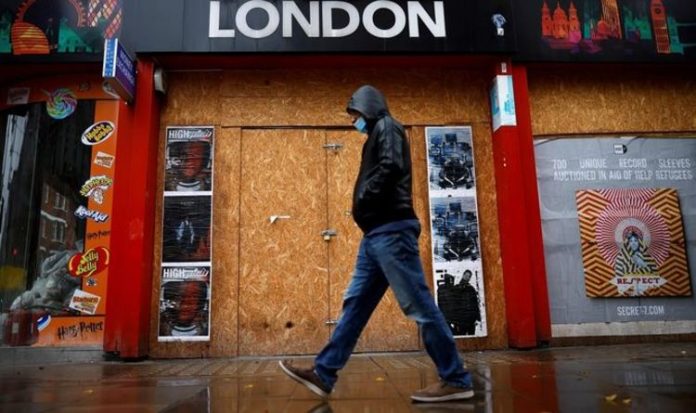England’s current month-long ‘lockdown two’ period is due to end on December 3, but Department of Health insiders have warned multiple on-off circuit-breaker lockdowns could be possible afterwards. It comes as the UK prepares to roll-out a COVID-19 vaccine to get the virus under control, but draft NHS plans show widespread vaccination of adults will not be underway until the start of April.
Now, Julian Jessop, Economic Fellow at free-market think tank the Institute of Economic Affairs, has said the uncertainty of future lockdowns could cause businesses to collapse.
He told Express.co.uk: “A policy of stop, start and then stop again is likely to impose additional costs and the prospect of more lockdowns is likely to increase uncertainty.
“Even another brief period of disruption may be the final straw for some businesses that have only just survived the first lockdown, or families that have already exhausted their savings.”

Businesses may be harmed by uncertainty caused by future lockdowns, an analyst has said (Image: Tolga Akmen / AFP / Getty)
There are some positive signs, however. The expert added there are reasons to believe this second lockdown – and subsequent ones – will be less economically damaging than the first.
He said: “There are some good reasons to believe that the individual impact of each successive lockdown may be less than the last, as people and businesses adapt and find new ways to work within the rules.
“Government support can also be better targeted to protect the most vulnerable jobs.”
READ: Working-classes left behind under coronavirus lockdowns, warns expert

Boris Johnson has said the current lockdown will end on December 2 (Image: Christopher Furlong / Getty)
Paul Dales, chief UK economist at Capital Economics, agrees. He said Britons are now more used to working from home and added that keeping schools open is also beneficial.
He told The Guardian: “Shutting schools took a lot off GDP both directly and indirectly because parents had to take time off work to look after their children.”
Meanwhile, Carolyn Fairbairn, Director General of the Confederation of British Industry, has warned the government should match its second lockdown with a huge job creation scheme.
DON’T MISS:
Christmas lockdown: Hancock hints at new ‘set of rules’ for UK family reunion [INSIGHT]
Boris facing Tory revolt as MPs furiously reject looming Covid crackdown after December 2 [ANALYSIS]
Sunak issues swipe at Sturgeon as he praises UK ‘strength’ [INFO]

Some analysts say the second lockdown will not be as damaging as the first (Image: Jeff J Mitchell / Getty)
She also voiced concern about how the next generation will be hit by unemployment.
The business expert, whose tenure as head of the CBI is coming to an end, said the government should also participate in a proposed ‘national commission for economic recovery’ which would also involve unions, universities and businesses.
She told Politico: “The single thing I think the government could do which would make the most difference is to work with business, hand in glove, to create a one-year revival plan that is practical, that is directed at job creation.”

Carolyn Fairbairn, CBI head, advised the government to take part in an economic recovery commission (Image: Adrian Dennis / AFP / Getty)

Global coronavirus figures (Image: EXPRESS)
Meanwhile, businesses must also prepare for the end of the Brexit transition period on January 1.
It is still unknown whether the UK will leave the EU without a deal. A spokesman for the Prime Minister said last week that “time is in short supply”.
Jonathan Blake, political correspondent for the BBC, had said “nobody expects” the talks to continue past this week.

Michel Barnier, the EU’s Brexit negotiator, in London last week (Image: Leon Neal / Getty)
However, negotiators on both sides are currently discussing how to continue face-to-face talks after they switched online this week following a positive coronavirus case.
Dutch financial services giant ING said in September it is “unrealistic” to expect Britain’s GDP to suddenly plunge after December 31.
However, it claimed businesses across a range of sectors could face higher costs as a result, “potentially compounding the Covid-19 hit”.







